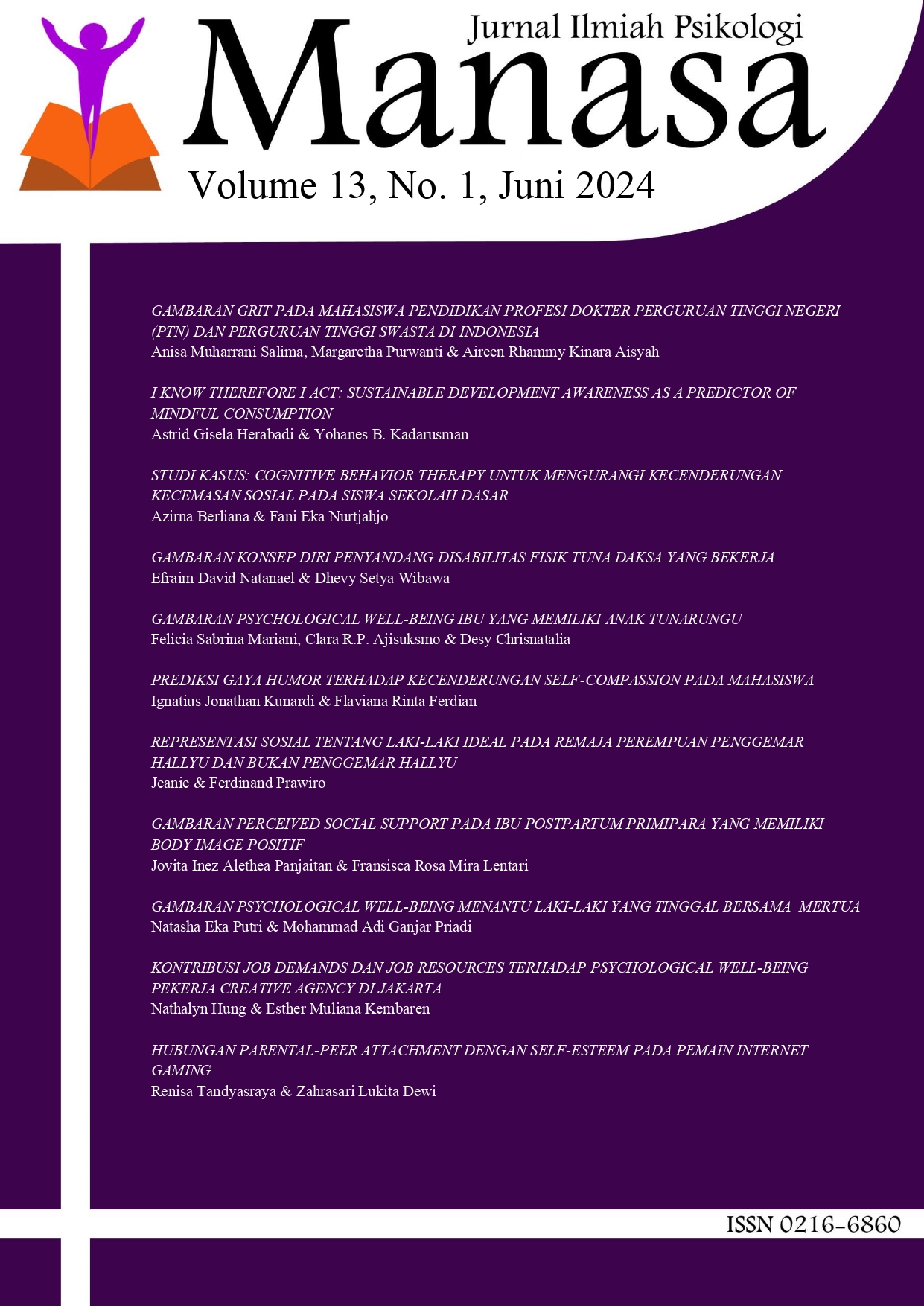PSYCHOLOGICAL WELL-BEING IBU YANG MEMILIKI ANAK TUNARUNGU
DOI:
https://doi.org/10.25170/manasa.v13i1.5499Keywords:
psychological well-being, deaf children, motherAbstract
The various challenges faced by parents of deaf children can cause stress in parents. The stress experienced by parents in raising deaf children harms the parent's ability to care for children so it can have an impact on the psychological well-being of parents, especially mothers of deaf children. The aim of this research is to explore and understand the psychological well-being of mothers in caring for their deaf children. The method used in this research is narrative qualitative. The sampling method was carried out using a purposive sampling method. Data collection was carried out using a semi-structured interview method. The participants in this research were four mothers of deaf children whose ages were between six years old until twelve years old and who attended special schools. The results of this study show that the challenges in caring for a deaf child can have an impact on the mother's psychological well-being. In terms of self-acceptance, mothers accept the condition of their deaf children but tend to be dissatisfied with the care they provide for their children. The mother's attempts to broaden her understanding about deaf children and their care, demonstrate the personal growth component. In terms of positive relations with others, friends in the community are a source of enthusiasm for the mother in raising children. The demand to care for children independently encourages mothers to develop aspects of autonomy and environmental mastery. When it comes to their purpose in life, mothers have the desire to make their children become self-sufficient and able to communicate in the future.
References
Braun, V., & Clarke, V. (2006). Using thematic analysis in psychology. Qualitative Research in Psychology, 3(2), 77–101. https://doi.org/10.1191/1478088706qp063oa
Creswell, J. W., & Creswell, J. D. (2018). Research design: Qualitative, quantitative, and mixed method approaches, 5th ed. Los Angeles: SAGE.
David, V. B. (2021). Associations between parental mental health and child maltreatment: The importance of family characteristics. Social Sciences (Basel), 10(6), 190.
https://doi.org/10.3390/socsci10060190
Desiningrum, D.R., Suminar, D.R., & Surjaningrum, E.R. (2019). Psychological well-being among mothers of children with autism spectrum disorder: The role of family function. Humanitas Indonesian Psychological Journal, 16(2), 106-115.
Dodge, R., Daly, A. P., J., H., & Sanders, L. D. (2012). The challenge of defining wellbeing. International Journal of Wellbeing, II(3), 222-235. doi:10.5502/ijw.v2i3.4
Dogan, M.E. (2014). Comparison of the Parents of Children with and without Hearing Loss in Terms of Stress, Depression, and Trait Anxiety. International Journal of Early Childhood Special Education, 2, 231-246. doi:10.20489/INTJECSE.30873
Erbasi, E., Scarinci, N., Hickson, L., & Ching, T. Y. C. (2018). Parental involvement in the care and intervention of children with hearing loss. International Journal of Audiology, 57(sup2), S15–S26. https://doi.org/10.1080/14992027.2016.1220679
Faramarzi, S. (2017). Comparing the quality of life and psychological well-being in mothers of children with hearing loss and mothers of children with other special needs. Aud Vest Res, 26(2), 86-92. https://avr.tums.ac.ir/index.php/avr/article/view/151/83.
Fellinger, J., Dr, Holzinger, D., & Pollard, R. (2012). Mental health of deaf people. The Lancet (British Edition), 379(9820), 1037-1044. https://doi.org/10.1016/S0140-6736(11)61143-4
Ghasempour, A., Akbari, E., Taghipour, M., Azimi, Z., & Refaghat, E. (2012). Comparison of psychological well-being and coping styles in mothers of deaf and normally-hearing children. Shinavāyi/shināsi-i, 21(4), 51-59.
Hidayati, F., Kaloeti, D. V. S., & Karyono, K. (2011). Peran ayah dalam pengasuhan anak. Jurnal Psikologi Undip, 9(1).
Hizbullah, Kahfi & Mulyati, Rina. (2022). The Role of Gratitude and Family Support on Psychological Well-Being of Mothers with Autistic Children. International Journal of Islamic Educational Psychology. 3. 10.18196/ijiep.v3i1.13190
Jean, Y. Q., Mazlan, R., Ahmad, M., & Maamor, N. (2018). Parenting stress and maternal coherence: mothers with deaf or hard-of-hearing children. American journal of audiology, 27(3), 260–271. https://doi.org/10.1044/2018_AJA-17-0093
Kasin C., Munoz K., Ong C., Whicker J., Twohig M. (2020). Well-being of parents of children who are deaf or hard of hearing. The Journal of Early Hearing Detection and Intervention, 5(1), 86-97.
Lundy, J. E. B. (2002). Age and language skills of deaf children in relation to theory of mind development. Journal of Deaf Studies and Deaf Education, 7(1), 41–56. https://doi.org/10.1093/deafed/7.1.41
Maulinda AV, Murti B, Adriani RB (2021). The Experience of Mothers Caring for Children with Disabilities at the Persatuan Rakyat Indonesia Special School in Pekalongan, Central Java: A Phenomenological Study. J Matern Child Health. 06(06): 632-641. https://doi.org/10.26911/thejmch.2021.06.06.01
Marks, N. F., Bumpass, L. L., & Jun, H. (2004). Family Roles and Well-Being during the Middle Life Course. In O. G. Brim, C. D. Ryff, & R. C. Kessler (Eds.), How healthy are we?: A national study of well-being at midlife (pp. 514–549). The University of Chicago Press.
Marschark, M., & Hauser, P. C. (2012). How deaf children learn: What parents and teachers need to know. Oxford University Press.
Mccreary, L. L. (2014). Dimensions of family functioning: Perspectives African American families of low-income single-parent. Journal of Marriage and Family, 66(3), 690–701
NIH (National Library of Medicine). (2017, 11 30). Hearing loss and deafness: Normal hearing and impaired hearing. Diakses pada 26 Juni 2023. https://www.ncbi.nlm.nih.gov/books/NBK390300/
Opoku, M. P., Nketsia, W., Benefo, E. B., & Mprah, W. K. (2020). Understanding the parental experiences of raising deaf children in Ghana. Journal of Family Studies, 1–20. https://doi.org/10.1080/13229400.2020.1815557
Parmanti, P., & Purnamasari, S. E. (2015). Peran ayah dalam pengasuhan anak. Insight: Jurnal Ilmiah Psikologi, 17(2), 81. https://doi.org/10.26486/psikologi.v17i2.687
Peterson, C. C. (2009). Development of social-cognitive and communication skills in children born deaf. ScanDvian Journal of Psychology, 50(5), 475–483. https://doi.org/10.1111/j.1467-9450.2009.00750.x
Peterson, C. C., O'Reilly, K., & Wellman, H. M. (2016). Deaf and hearing children's development of theory of mind, peer popularity, and leadership during middle childhood. Journal of experimental child psychology, 149, 146–158. https://doi.org/10.1016/j.jecp.2015.11.008
Polat, F. (2003). Factors affecting psychosocial adjustment of deaf students. Journal of Deaf Studies and Deaf Education, 8(3), 325–339. doi:10.1093/deafed/eng018
Poon, B. T., & Zaidman-Zait, A. (2014). Social support for parents of deaf children: Moving toward contextualized understanding. Journal of Deaf Studies and Deaf Education, 19(2), 176–188. https://doi.org/10.1093/deafed/ent041
Pusat Data dan Informasi Kementerian Kesehatan RI. (2019). Infodatin tunarungu 2019. Jakarta: Kementerian Kesehatan RI Pusat Data dan Informasi. Diakses melalui https://pusdatin.kemkes.go.id/resources/download/pusdatin/infodatin/infodatin-tunarungu-2019.pdf
Quittner, A. L., Barker, D. H., Cruz, I., Snell, C., Grimley, M. E., Botteri, M., & CDaCI Investigative Team. (2010). Parenting stress among parents of deaf and hearing children: Associations with language delays and behavior problems. Parenting, 10(2), 136–155. https://doi.org/10.1080/15295190903212851
Rieffe C., Terwogt M., M. (2006). Anger communication in deaf children. Cognition and Emotion, 20(8), 1261-Cognition and Emotion, 20(8), 1261-1273. doi: 10.1080/02699930500513502
Rieffe, C. (2012). Awareness and regulation of emotions in deaf children. British Journal of Developmental Psychology, 30(4), 477-492. https://doi.org/10.1111/j.2044-835X.2011.02057.x
Roberson, L., & Shaw, S. (2015). Reflections on deaf education: Perspectives of deaf senior citizens. Educational Gerontology, 41(3), 226-237. https://doi.org/10.1080/03601277.2014.951194
Ryff, C. D. (1989). Happiness is everything, or is it? Explorations on the meaning of psychological well-being. Journal of Personality and Social Psychology, 57(6), 1069–1081. https://doi.org/10.1037/0022-3514.57.6.1069
Ryff C. D. (2014). Psychological well-being revisited: Advances in the science and practice of eudaimonia. Psychotherapy and psychosomatics, 83(1), 10–28. https://doi.org/10.1159/000353263
Sarant, J. Z., Harris, D. C., & Bennet, L. A. (2015). Academic outcomes for school-aged children with severe-profound hearing loss and early unilateral and bilateral cochlear implants. Journal of Speech, Language, and Hearing Research, 58(3), 1017-1032. https://doi.org/10.1044/2015_JSLHR-H-14-0075
Theunissen, S. C. P. M, Rieffe, C., Netten, A. P., Briaire, J. J., Soede, W., Kouwenberg, M., & Frijns, J. H. M. (2014). Self-esteem in hearing-impaired children: The influence of communication, education, and audiological characteristics. PLoS One, 9(4). http://dx.doi.org/10.1371/journal.pone.0094521
Szarkowski, A., & Brice, P. (2004). Positive Aspects of Parenting a Deaf Child: Categories of Potential Positive Influences. JADARA, 37(2). Diakses melalui https://nsuworks.nova.edu/jadara/vol37/iss2/6
Tapp, B., Gandy, M., Fogliati, V. J., Karin, E., Fogliati, R. J., Newall, C., Mclellan, L., Titov, N., & Dear, B. F. (2017). Psychological distress, help‐seeking, and perceived barriers to psychological treatment among Australian parents. Australian Journal of Psychology, 70(2), 113–121. https://doi.org/10.1111/ajpy.12170
Vaccari, C., & Marschark, M. (1997). Communication between parents and deaf children: Implications for social-emotional development. Child Psychology & Psychiatry & Allied Disciplines, 38(7), 793–801. https://doi.org/10.1111/j.1469-7610.1997.tb01597.x
Webster, C. M. (2008). Intrinsic motivation and well‐being: Seniors in community associations. Journal of Nonprofit & Public Sector Marketing, 20(2), 229–244. doi:10.1080/10495140802224878
WHO (World Health Organization). (2007). International classification of functioning, disability and health: Children and youth version: ICF-CY. World Health Organization. https://apps.who.int/iris/handle/10665/43737
WHO (World Health Organization). (2021). Deafness and hearing loss. Diakses pada 1 November 2023. https://www.who.int/news-room/fact-sheets/detail/deafness-and-hearing-loss
Young, A. (2018). Deaf children and their families: sustainability, sign language, and equality. American Annals of the Deaf, 163(1), 61–69. https://doi.org/10.1353/aad.2018.0011
Downloads
Published
Issue
Section
License
Copyright (c) 2024 MANASA

This work is licensed under a Creative Commons Attribution-NonCommercial-ShareAlike 4.0 International License.









.png)
.png)

